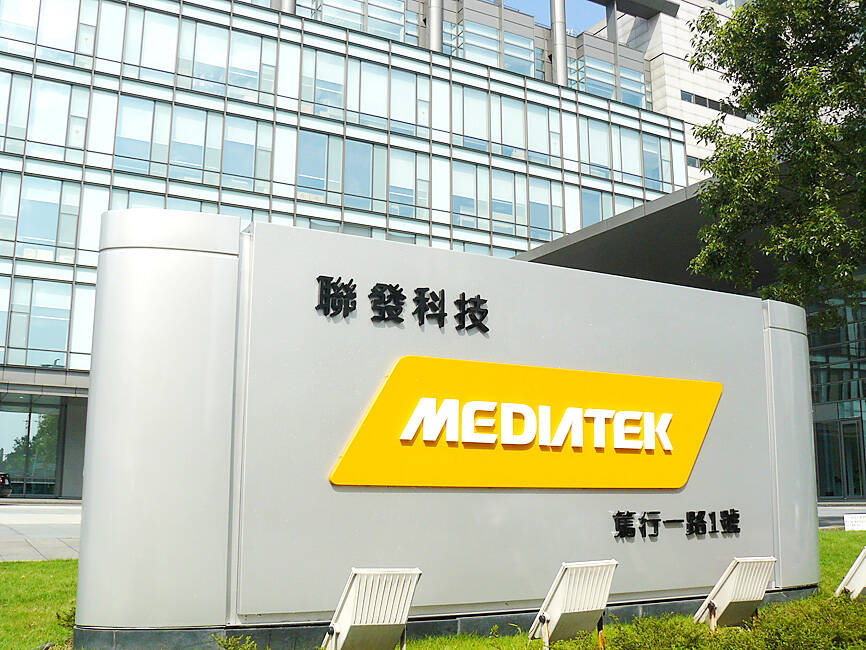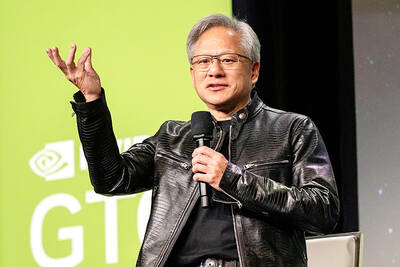MediaTek Inc (聯發科), the largest IC designer in Taiwan, last year paid its nonmanagement employees the highest average yearly salaries of all the companies listed on the Taiwan Stock Exchange (TWSE), while Taiwan Semiconductor Manufacturing Co (TSMC, 台積電), the world’s largest contract chipmaker, was seventh, the exchange said on Monday.
MediaTek, which specializes in smartphone IC design, paid an average salary of NT$4.867 million (US$156,414) to its nonmanagement employees last year, TWSE data showed.
Despite retaining the No. 1 title for pay, average salaries at the firm dropped from about NT$5.15 million recorded in 2021, the data showed.

Photo: CNA
TSMC, the most profitable company in Taiwan, ranked seventh, paying an average of NT$3.167 million to nonmanagement employees, a 30 percent rise from an average of NT$2.425 million paid to workers in 2021, which had put it in 16th place.
Eight of the top 10 companies on the pay list are in the semiconductor industry, while two are in shipping.
Evergreen Marine Corp (長榮海運, No. 3, NT$4.575 million) and Yang Ming Marine Transport Corp (陽明海運, No. 9, NT$2.957 million), featured high in the rankings amid fast-growing freight rates and port congestion.
Raydium Semiconductor Corp (瑞鼎科技), a display driver IC designer, ranked second after paying an average of NT$4.866 million to its nonmanagement employees last year, while Novatek Microelectronics Corp (聯詠科技), another display driver IC designer, was fourth with an average pay of NT$3.959 million.
Rounding out the top 10 were communications network IC designer Realtek Semiconductor Corp (瑞昱半導體, No. 5, NT$3.839 million), display driver IC designers Sitronix Technology Corp (矽創電子, No. 6, NT$3.641 million) and Fitipower Integrated Technology Inc (天鈺科技, No. 8, NT$2.958 million) and complementary metal-oxide-semiconductor image sensor designer Silicon Optronics Inc (晶相光電, No. 10, NT$2.777 million), TWSE data showed.

‘DECENT RESULTS’: The company said it is confident thanks to an improving world economy and uptakes in new wireless and AI technologies, despite US uncertainty Pegatron Corp (和碩) yesterday said it plans to build a new server manufacturing factory in the US this year to address US President Donald Trump’s new tariff policy. That would be the second server production base for Pegatron in addition to the existing facilities in Taoyuan, the iPhone assembler said. Servers are one of the new businesses Pegatron has explored in recent years to develop a more balanced product lineup. “We aim to provide our services from a location in the vicinity of our customers,” Pegatron president and chief executive officer Gary Cheng (鄭光治) told an online earnings conference yesterday. “We

LEAK SOURCE? There would be concern over the possibility of tech leaks if TSMC were to form a joint venture to operate Intel’s factories, an analyst said Taiwan Semiconductor Manufacturing Co (TSMC, 台積電) yesterday stayed mum after a report said that the chipmaker has pitched chip designers Nvidia Corp, Advanced Micro Devices Inc and Broadcom Inc about taking a stake in a joint venture to operate Intel Corp’s factories. Industry sources told the Central News Agency (CNA) that the possibility of TSMC proposing to operate Intel’s wafer fabs is low, as the Taiwanese chipmaker has always focused on its core business. There is also concern over possible technology leaks if TSMC were to form a joint venture to operate Intel’s factories, Concord Securities Co (康和證券) analyst Kerry Huang (黃志祺)

It was late morning and steam was rising from water tanks atop the colorful, but opaque-windowed, “soapland” sex parlors in a historic Tokyo red-light district. Walking through the narrow streets, camera in hand, was Beniko — a former sex worker who is trying to capture the spirit of the area once known as Yoshiwara through photography. “People often talk about this neighborhood having a ‘bad history,’” said Beniko, who goes by her nickname. “But the truth is that through the years people have lived here, made a life here, sometimes struggled to survive. I want to share that reality.” In its mid-17th to

‘MAKE OR BREAK’: Nvidia shares remain down more than 9 percent, but investors are hoping CEO Jensen Huang’s speech can stave off fears that the sales boom is peaking Shares in Nvidia Corp’s Taiwanese suppliers mostly closed higher yesterday on hopes that the US artificial intelligence (AI) chip designer would showcase next-generation technologies at its annual AI conference slated to open later in the day. The GPU Technology Conference (GTC) in California is to feature developers, engineers, researchers, inventors and information technology professionals, and would focus on AI, computer graphics, data science, machine learning and autonomous machines. The event comes at a make-or-break moment for the firm, as it heads into the next few quarters, with Nvidia CEO Jensen Huang’s (黃仁勳) keynote speech today seen as having the ability to